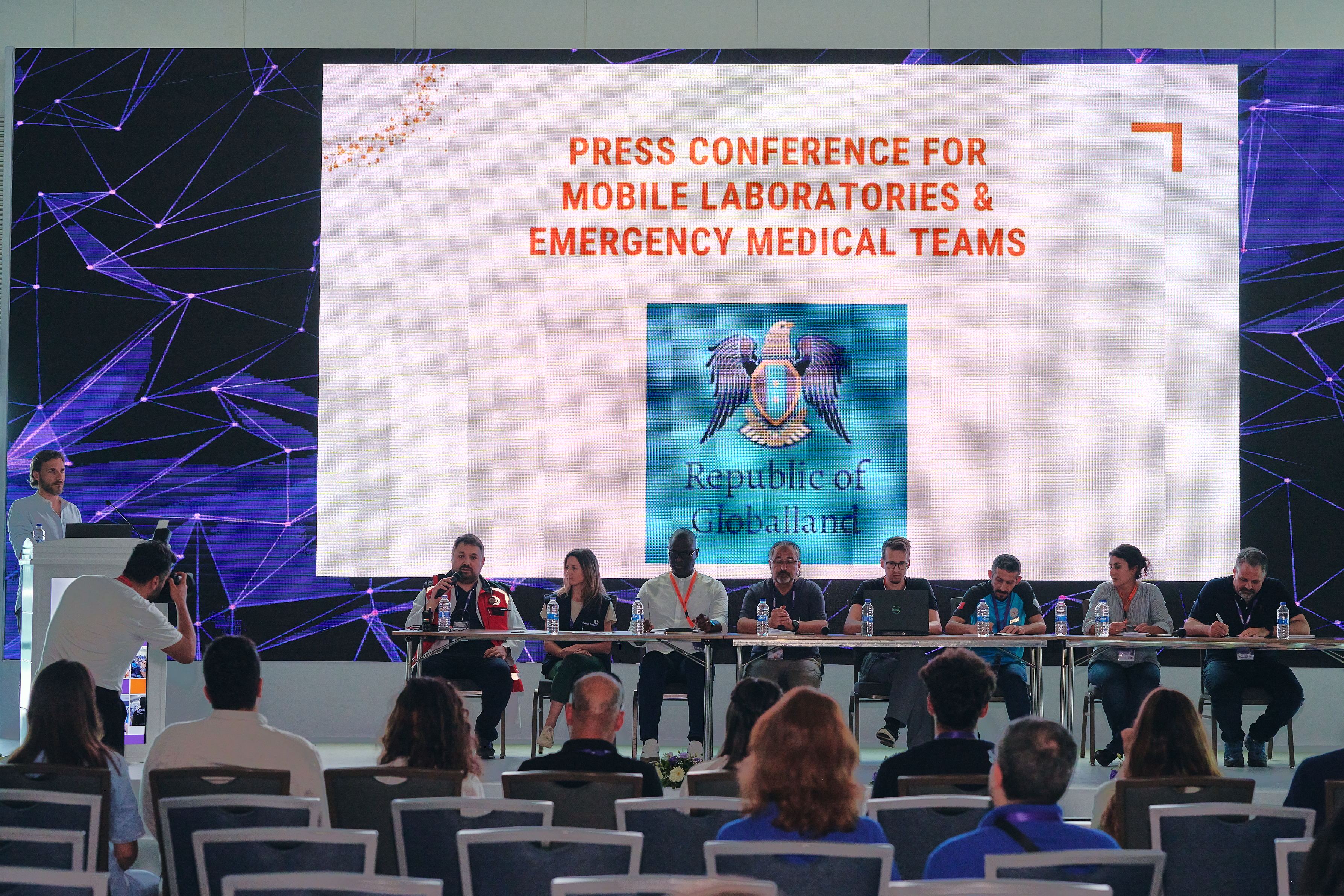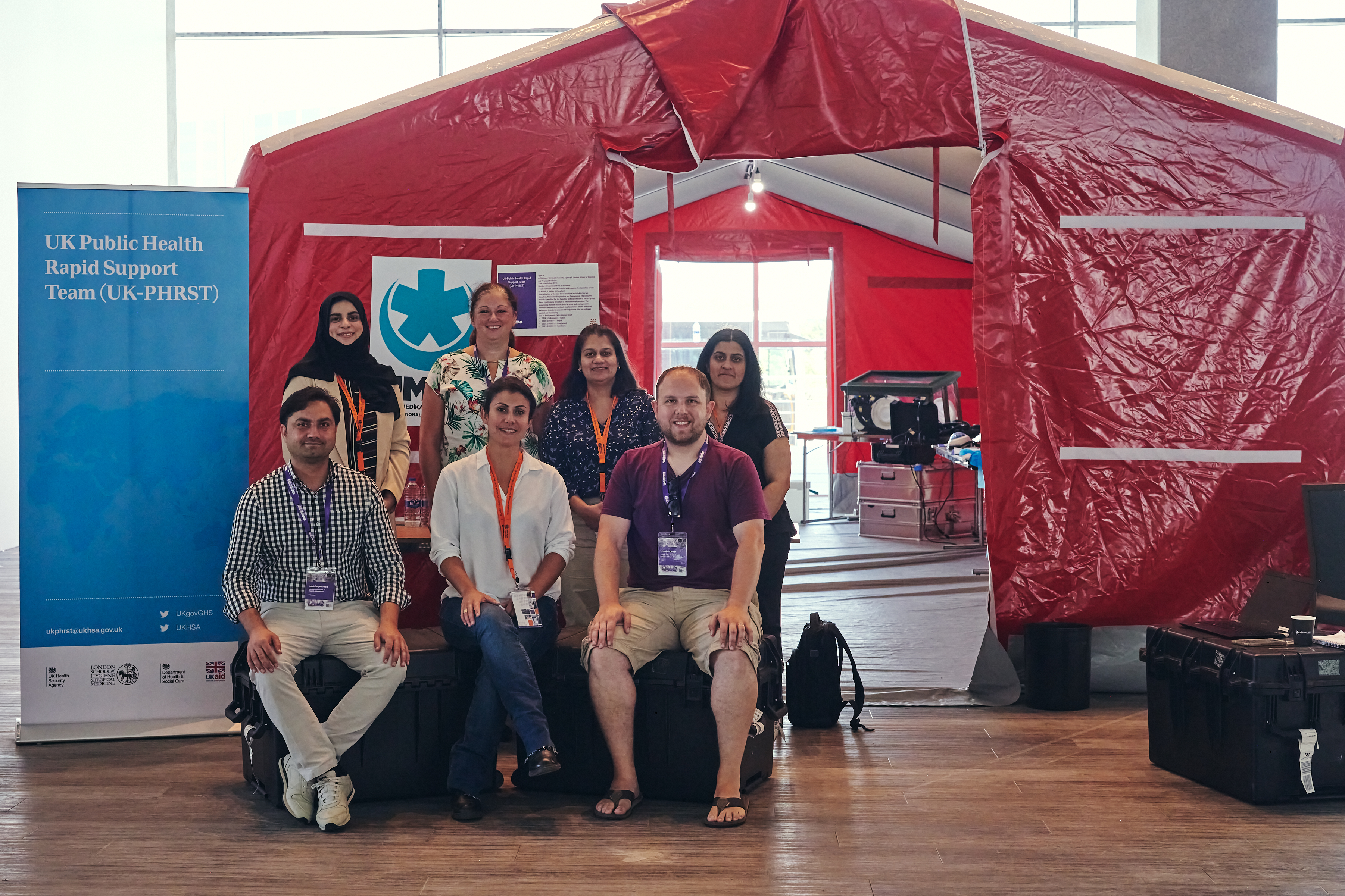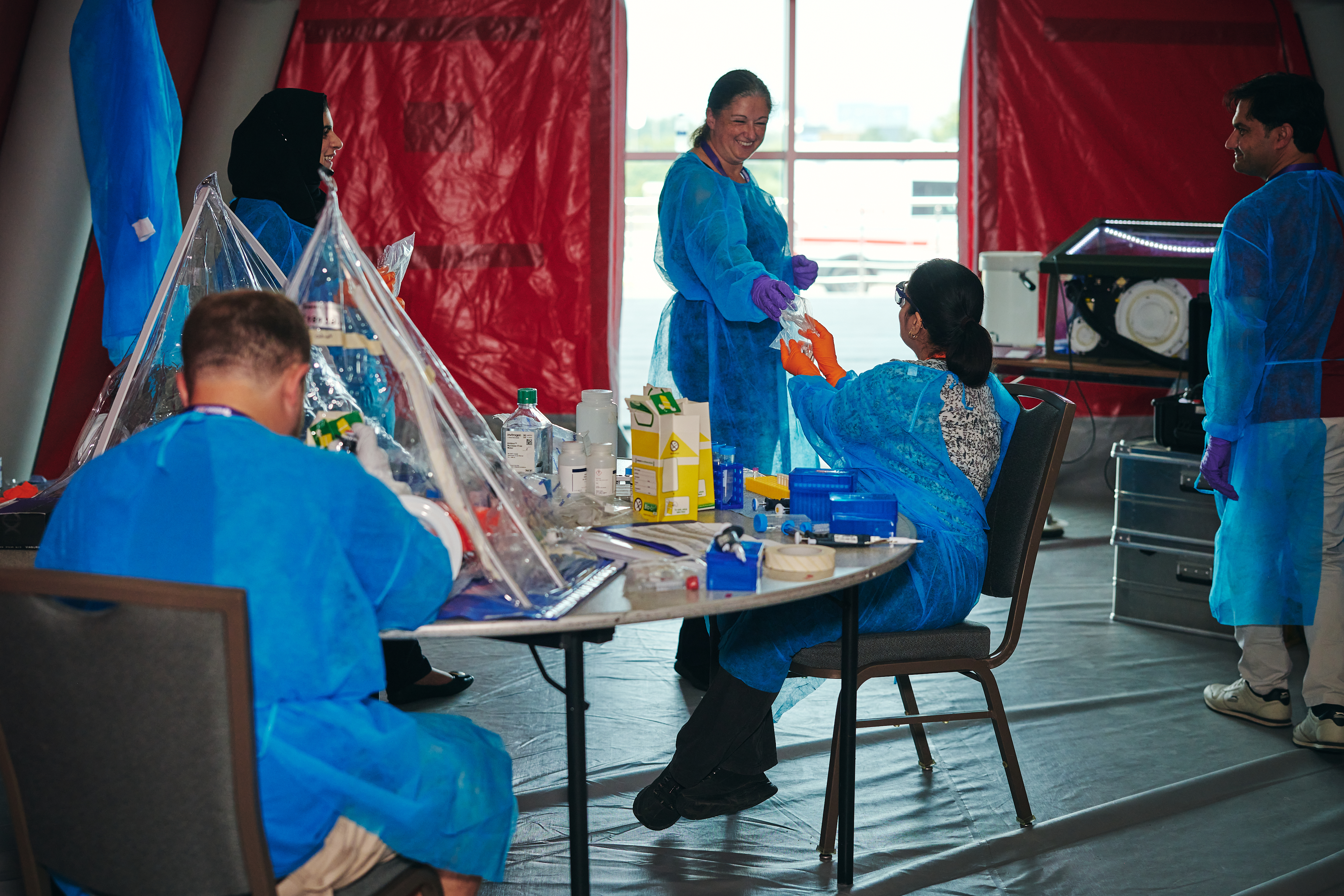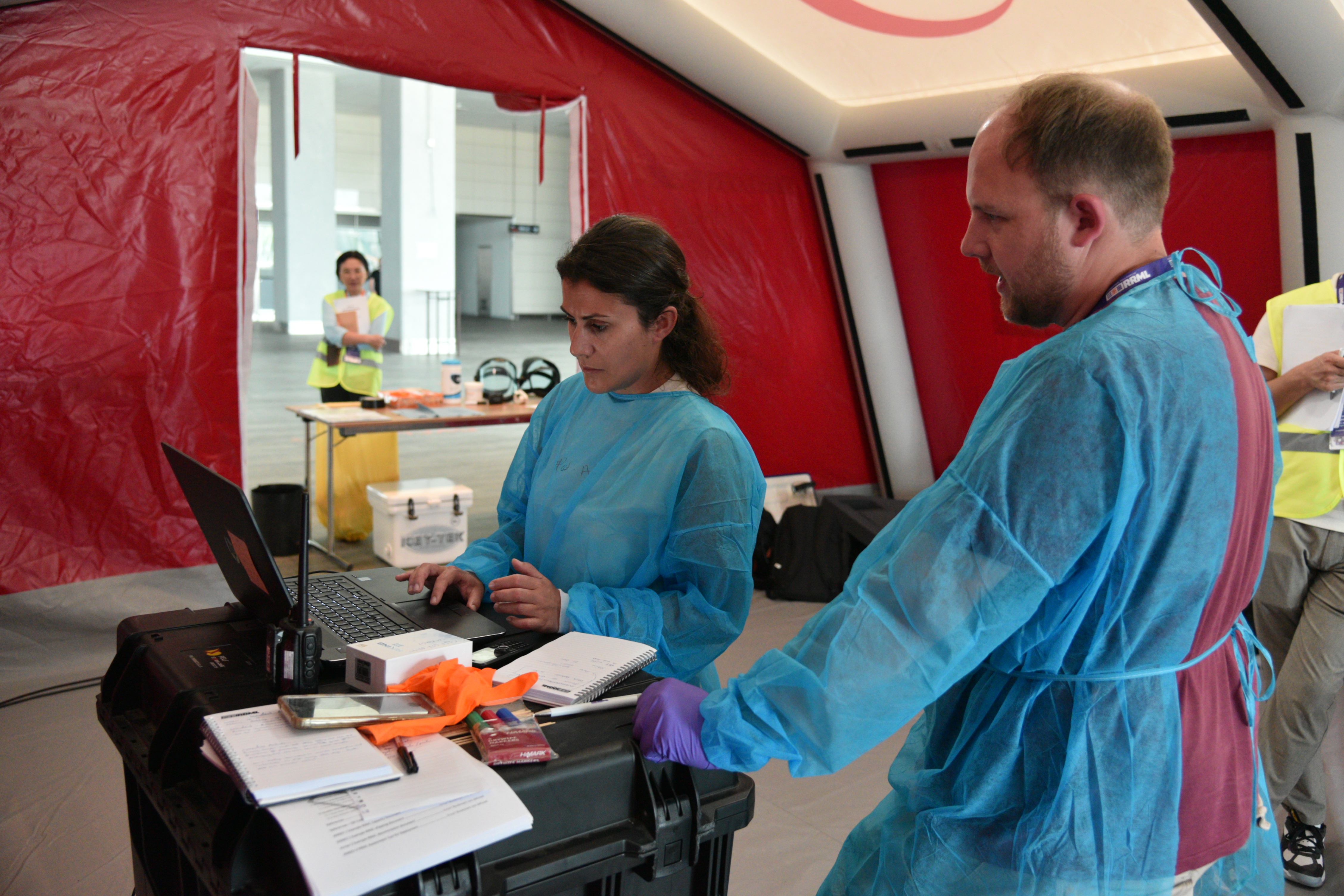
Rapid Response Mobile Labs (RRMLs) help boost mobile diagnostic capacities in public health emergencies and can bring critical laboratory resources to the doorstep of affected and vulnerable communities during outbreaks, who are often in hard-to-reach remote areas.
The RRML Network – a community of practice of lab specialists and experts created by the World Health Organization (WHO) and Global Outbreak Alert and Response Network (GOARN) – recently set about creating, testing and refining a common set of RRML Minimum Operational Standards. The standards aim to ensure a consistent, high quality and interoperable response between different RRML teams based across the world, who may be jointly deployed to respond to outbreaks.
As a part of the RRML Network, the UK-Public Health Rapid Support Team (UK-PHRST) took part in the first ever Interregional Field Simulation Exercise (IFX): a three-part exercise to review and test the proposed minimum standards across the whole RRML life cycle, from pre-deployment, during outbreak response and end-of-mission phases. The exercise also tested how RRMLs work alongside other WHO health emergency workforce assets, such as Emergency Medical Teams (EMTs), just as in a real outbreak.
The UK-PHRST microbiology team has been contributing to the drafting of the RRML Minimum Operational Standards since 2021. Under the leadership of WHO Europe, UK-PHRST has led on the biosafety and biosecurity component,collaborating with 30 others European technical experts. The UK-PHRST Director Ed Newman was also part of the board of experts tasked with planning the exercise alongside colleagues from other Public Health Institutions who have Mobile Lab capacity and experience, and WHO Europe.
Here are the highlights, challenges and learnings from the three-part exercise.
UK-PHRST team at 'Globalland' during IFX.01. Photo credit: WHO Europe
Mission phase: pre-deployment and mission assignment
Format: Virtual tabletop exercise
Location: Robert Koch Institute, Berlin, Germany
Date: May 2023
UK-PHRST and other RRML network members took part in a hybrid tabletop exercise to introduce the simulation scenario and start testing the pre-deployment and mission assignment phase of a RRML deployment cycle.
Participants attended the exercise's first WHO Situation Meeting and were briefed on an emergency taking place in the fictitious country of Globalland, where prolonged periods of drought had led to high levels of malnutrition and displacement of its communities. The country was also experiencing large-scale cross-border migration from neighbouring states. In addition, the already fragile health system was now facing a new challenge: a newly identified outbreak of influenza A (H5N8) virus. This was classed as a major public health concern in the region and Globalland’s Ministry of Health (MoH) identified the need to strengthen disease surveillance, early warning systems and laboratory testing capacity across the country.
In response, the MoH, supported by the Globalland WHO Country Office, released a formal Request for Assistance through the GOARN network. Each RRML team undertook virtual scoping missions in the country districts to gather additional information on the nature of the proposed deployment, and subsequently detailed the type of laboratory surge capacity offered and logistics considerations for deployment to Globalland’s MoH. The MoH then allocated specific districts of Globalland to different lab and EMT teams.
As the Mission Assignment phase was concluded, the team returned to the UK to commence preparations for RRML and team deployment to Globalland.
Mission phase: outbreak response
Format: Functional exercise part one (IFX.01)
Location: Istanbul, Türkiye
Date: June 2023
Hosted by Türkiye’s Ministry of Health and located in a terminal building of the old Istanbul airport, the UK-PHRST microbiology team officially entered ‘Globalland’. The RRMLs of eight countries responded to the request for assistance and arrived in the field, prepared with the necessary equipment and reagents to run laboratory diagnostic activities within their district. The focus of this exercisewas on supporting interoperability between RRMLs and other WHO Health Emergency Workforce in the field, such as EMTs.
Ready with its Influenza A/B real-time PCR testing capability and an ONT MinION Mk1C for metagenomic sequencing, the UK-PHRST microbiology team received mock nose and throat swab samples from the EMTs. The team inactivated the samples in a portable glovebox, extracted the genetic material and PCR tested it to confirm its diagnosis, reporting the results back to the EMTs and Globalland MoH. The UK-PHRST team also received a sample for metagenomic sequencing, and owing to the team’s technical capability and expertise, they were the first to successfully identify the sample as Influenza A H5N8 in real time. Just as in real-world outbreaks, wider scenarios were simultaneously practised, including additional requests for interoperability agreements with EMTs, infection prevention and control policies, briefings and a simulated media conference.
The UK-PHRST team in action during IFX.01. Photo credit: WHO Europe
The UK-PHRST team were also joined by two laboratory colleagues from National Institute of Health Islamabad, Pakistan who integrated into the team during the simulation exercise - re-enforcing peer-to-peer mutual learning, strengthening the capacity of both teams and cementing international co-operation.
The exercise in Istanbul not only provided a valuable opportunity to test the UK-PHRST’s mobile lab equipment and systems for responding to WHO requests, but also enabled each member of the RRML network towork on interoperability with other mobile labs and multiple emergency response teams, improving their readiness to deploy rapidly and work efficiently during an outbreak anywhere in the world.
Dr Ed Newman, UK-PHRST Director discusses what we learned during IFX.01. Video credit: WHO Europe
Mission phase: end of mission
Format: Functional exercise part two (IFX.02)
Location: Kachreti, Georgia
Date: February 2024
Building on the learnings from the previous exercise, the focus of the final exercise was to further test the minimum operational standards and coordination mechanisms throughout the mission execution and end of mission phase. This exercise also focused on RRML activities, different deployment mechanisms, joint coordination, sample reception and transport between health facilities and health emergency workforce, data exchange and joint in-field logistics support.
This time bolstered by newly recruited microbiology reservists, UK-PHRST received mock nose and throat samples and started analysing them using cutting-edge equipment new to the team’s RRML set-up. One of these instruments, the Biofire Torch, allows up to 45 different tests to be performed simultaneously on each sample within an hour; a vital tool in diagnosing disease when the exact pathogen is unknown. Another new instrument, the GridION, allows rapid whole genome sequencing for up to 480 samples at a time which provides accurate data that can be used to identify drug resistance, develop new tests and helps with tracking and controlling diseases during an outbreak. Using these new methods and equipment, the UK-PHRST team successfully identified a range of influenza strainsand other respiratory viruses.
From left to right: UK-PHRST microbiology lead Cristina Leggio and microbiologist Dan Carter. Photo credit: WHO Europe
During this exercise, the Interregional Coordination Group of the RRML Network was also convened. This brought together high-level representation from WHO, GOARN and partner institutions across WHO Regions to inform and develop overarching scope, architecture, resourcing and implementation plan to strengthen the RRML initiative by 2030. During this day-long event, participants reflected on the achievements of the RRML initiative then, via group discussions facilitated by subject matter experts including the UK-PHRST Microbiology Lead, built consensus on the RRML Network terms of reference, vision, strategic goals and objectives.
Speaking the same language in RRML deployments
Participants from eight RRMLs, including representatives from over 35 countries, took part in the simulation exercise series throughout 2023-2024. Overall, the WHO interregional IFX was an excellent opportunity to showcase the important nature of team-working towards a common goal, for sharing good practice, and providing further feedback to the draft RRML Minimum Standards ahead of its publication – ensuring they are fit for purpose in the real-world and ensure a seamless joint response in the field to future outbreaks.
UK-PHRST microbiology lead Cristina Leggio takes part in a mock media conference during IFX.01. Photo credit: WHO Europe
Useful Resources
Related Articles
-
Antimicrobial Stewardship and Surveillance: Great Expectations
BY yogandree -
Streptococcal Pharyngitis - 2012 IDSA Guidelines
BY Stanford T. Shulman, Alan L. Bisno, Herbert W. Clegg, Michael A. Gerber, Edward L. Kaplan, Grace Lee, Judith M. Martin, Chris Van Beneden -
Evaluation of a Typhoid/Paratyphoid Diagnostic Assay (TPTest) Detecting Anti-Salmonella IgA in Secretions of Peripheral Blood in Lymphocytes in Patients in Dhaka, Bangladesh
BY Farhana Khanam, Alaullah Sheikh, Abu Sayeed, Saraur Bhuiyan, Feroza Kaneez Choudhury, Umme Salma, Shahnaz Pervin, Tania Sultana, Dilruba Ahmed, Doli Goswami, Lokman Hossain, KZ Mamun, Richell C Charles, W. Abdullah Brooks, Stephen B. Calderwood, Alejandro Cravioto, Edward T Ryan, Firdausi Qadri -
Community-Based Interventions for the Prevention and Control of Infectious Diseases of Poverty
BY rehanasalam -
Candida albicans Pathogenicity and Epithelial Immunity
BY Naglik JR, Richardson JP, Moyes DL



Please Sign in (or Register) to view further.